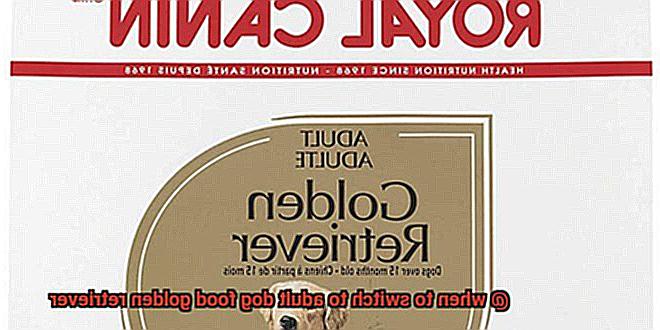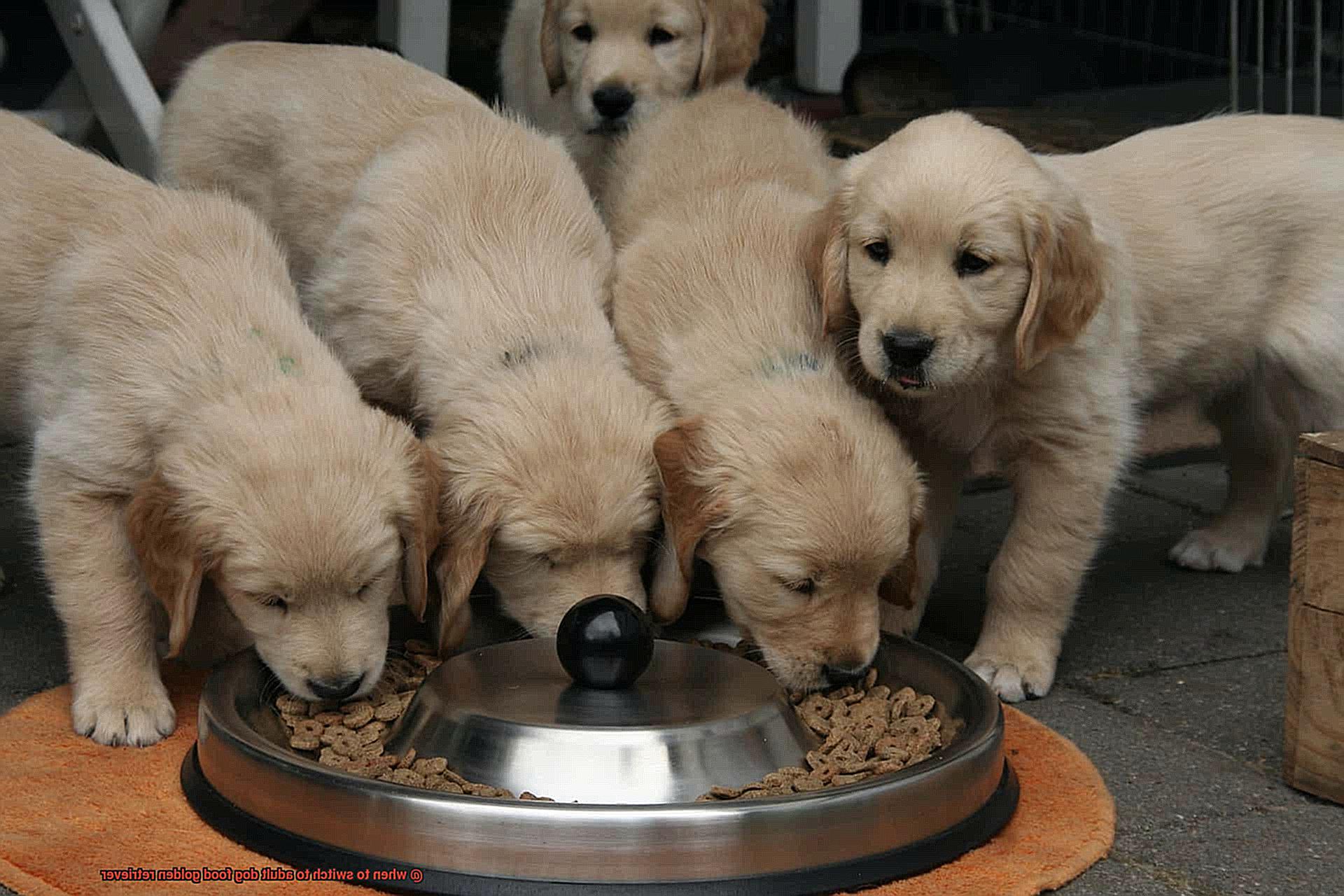Golden Retrievers are a beloved breed for their kind and devoted personality. As a responsible pet owner, you want to provide the best possible care for your furry friend, including their nutrition. One crucial aspect of your Golden Retriever’s diet is knowing when to switch from puppy food to adult dog food.
While it may be tempting to continue feeding your pup puppy food, it’s essential to transition them to adult dog food as they approach their first birthday. But how do you know when the time is right?

Different experts may have varying opinions on this matter, but there are some general guidelines that can help you make an informed decision. In this blog post, we’ll explore the factors that influence when to switch to adult dog food for your Golden Retriever and provide tips on making the transition as smooth as possible.
From watching for specific signs in your dog’s behavior to understanding the nutritional needs of adult dogs versus puppies, we’ve got you covered. Our goal is to ensure that your Golden Retriever receives optimal nutrition at every stage of their life so that they can continue being the happy and healthy companion you know and love.
What is the Optimal Age to Switch to Adult Dog Food for Golden Retrievers?
Contents
- 1 What is the Optimal Age to Switch to Adult Dog Food for Golden Retrievers?
- 2 Nutritional Requirements of Puppies and Adult Dogs
- 3 Factors to Consider When Switching to Adult Dog Food
- 4 Different Types of Adult Dog Foods Available
- 5 Transitioning Your Golden Retriever from Puppy to Adult Food
- 6 Signs That Your Golden Retriever Is Ready for Adult Dog Food
- 7 Conclusion
Golden retrievers are a beloved breed known for their friendly and loyal personality, as well as their love for food. As a responsible pet owner, it’s crucial to provide them with the proper nutrition they need to maintain good health. And one of the most common questions that pet owners ask is when to switch from puppy food to adult dog food.
Most veterinarians recommend switching your golden retriever to adult dog food at around one year old. At this age, most golden retrievers have reached their full adult size and require a different balance of nutrients than puppy food provides. Adult dog food is specially formulated with higher concentrations of essential vitamins, minerals, and nutrients that are necessary for maintaining their overall health.
However, it’s important to remember that every dog is unique and may mature at a different rate. Factors such as weight, activity level, and breed can also play a role in determining when to make the switch. So consulting with your veterinarian is key to determining the best time to make the change based on your individual dog’s needs.
When transitioning from puppy food to adult dog food, it’s crucial to do so gradually over several weeks. This gradual shift will allow your golden retriever’s digestive system to adjust to the new food without any upset stomachs or digestive issues.
Nutritional Requirements of Puppies and Adult Dogs

During the first year of life, puppies require a diet that is high in protein, fat, and calories to support their growth and development. To ensure proper muscle development and energy production, a diet that contains at least 22% protein and 8% fat is recommended. However, it’s important to avoid overfeeding your pup as this can lead to obesity and other health problems.
As your Golden Retriever puppy grows older, its dietary needs change. Large breed puppies like Golden Retrievers require a diet lower in calories and calcium to prevent skeletal problems such as hip dysplasia. It is recommended to switch to adult dog food when your Golden Retriever reaches 80% of its expected adult weight.
Adult dogs, on the other hand, require a balanced diet that meets their energy needs while maintaining their overall health. The ideal diet should contain at least 18% protein and 5% fat for maintenance. If your Golden Retriever is an active dog, you may need to feed it a diet with higher protein and fat content to meet its energy needs.
Consulting with your veterinarian is vital to determine the best nutritional plan for your Golden Retriever based on its unique needs. Switching to adult dog food at the right time is crucial to prevent health problems and ensure optimal nutrition.
Factors to Consider When Switching to Adult Dog Food
Switching to adult dog food is an important step in their growth and development, and there are several factors to consider when making this transition.
Firstly, age plays a crucial role in determining when to switch from puppy food to adult dog food. While most golden retrievers make the switch at around 1 year old, it’s important to consult with your veterinarian to determine the best time for your furry buddy based on their unique needs and growth rate.
As your golden retriever ages, their nutritional requirements change. Adult dog food is specifically formulated to meet these changing needs, so it’s important to select a high-quality adult dog food that provides the right balance of protein, fat, and other nutrients that your dog requires.
Your furry friend’s health status is another essential factor to consider when choosing an adult dog food. Some dogs have medical conditions such as kidney disease or diabetes that require a special diet. Others may have food allergies or sensitivities that require them to avoid certain ingredients. Consulting with your veterinarian can help you determine if any special dietary considerations are necessary for your golden retriever.
Finally, the size and activity level of your golden retriever should also be taken into account when selecting an adult dog food. Larger dogs require more calories and nutrients than smaller dogs, while highly active dogs need more protein and fat to fuel their energy needs. Therefore, it’s vital to choose a high-quality adult dog food that is appropriate for your furry buddy’s size and activity level.
Different Types of Adult Dog Foods Available

As your furry friend transitions from puppyhood to adulthood, it’s crucial to switch to adult dog food. With so many types of adult dog foods available in the market, selecting the perfect one for your beloved pet can be overwhelming. But don’t worry, we’ve got you covered.
The most common type of adult dog food is dry kibble. It’s convenient to store, affordable, and helps keep your dog’s teeth and gums clean. However, some dogs may find it challenging to chew or digest dry kibble, so it’s essential to monitor your golden retriever’s eating habits.
If you’re looking for something that your furry friend can’t resist, canned dog food might be the answer. Though more expensive than dry kibble, it’s considered more palatable and contains more moisture to keep your golden retriever hydrated. Keep in mind that canned dog food can be higher in calories and contribute to weight gain if overfed.
Semi-moist dog food is a third option for adult dogs. It’s softer than dry kibble but not as moist as canned dog food. On the downside, it can contain artificial preservatives or flavors and is usually pricier than dry kibble.
Specialty adult dog foods are also available for specific health conditions or dietary restrictions. These foods are formulated for dogs with sensitive stomachs or skin allergies and may even be grain-free or contain novel protein sources for dogs with food sensitivities.
Transitioning Your Golden Retriever from Puppy to Adult Food
Watching your beloved golden retriever grow up is an exciting experience, but as they mature, their nutritional needs will change. Making the transition from puppy food to adult food is crucial for their optimal health and development.
Experts recommend switching to adult food when your golden retriever reaches maturity between one and two years old. However, it’s vital to make the transition gradually over about a week to give their digestive system time to adjust.
To ease this process, start by mixing a small amount of adult food with their puppy food, and gradually increase the proportion of adult food over several days until they are eating only adult food. Patience is key during this period, so take it slow and steady.
When selecting an adult dog food for your golden retriever, remember to choose a high-quality product that meets their specific nutritional needs. Golden retrievers are prone to obesity, so opt for a low-fat and calorie diet that’s high in protein. Ensure that the first ingredient is real meat and avoid fillers like corn or wheat.
It’s also important to consider any health issues your furry friend may have when selecting an adult dog food. For example, if they have joint problems or suffer from allergies, look for a food that contains ingredients such as glucosamine or salmon oil that can help support joint health and reduce inflammation.
Signs That Your Golden Retriever Is Ready for Adult Dog Food
While puppy food may have been perfect for your little one, adult dog food is the way to go once your golden retriever reaches maturity. But how do you know when it’s time to make the switch?
Here are some signs that your golden retriever is ready for adult dog food:
Age
Golden retrievers typically reach adulthood between one and two years old. When your furry friend hits this milestone, it’s time to start thinking about switching to adult dog food.
Weight
If your golden retriever has reached its full size and weight, it’s time to switch to adult dog food. A fully grown male golden retriever can weigh between 65 and 75 pounds, while a female can weigh between 55 and 65 pounds.
Activity Level
If your golden retriever is highly active, it may require more calories than a less active dog. Adult dog food is formulated with higher calorie content to meet the nutritional needs of active dogs.
Dental Health
As your golden retriever grows, its teeth become stronger and more developed. Adult dog food has larger kibble sizes that help promote chewing, which can improve dental health.
Digestive Health
Puppies have sensitive digestive systems that require special diets. Adult dog food is formulated with less fat and protein to support healthy digestion in adult dogs.
To ensure that your golden retriever stays healthy and happy throughout their adult life, monitor their weight, activity level, and overall health regularly. Once you see these signs, it’s time to make the switch to high-quality adult dog food that meets their specific nutritional needs.
Conclusion
In conclusion, transitioning your Golden Retriever from puppy food to adult dog food is a pivotal moment in their growth and development. As they approach their first birthday, it’s essential to switch to adult dog food that provides the ideal balance of vital vitamins, minerals, and nutrients crucial for maintaining their overall health. However, keep in mind that every dog matures at a different rate, and factors such as weight, activity level, and breed can also influence when to make the switch.
It’s crucial to remember that switching from puppy food to adult dog food should be done gradually over several weeks. This gradual transition will allow your furry friend’s digestive system to adjust to the new food without any upset stomachs or digestive issues.
When selecting an adult dog food for your Golden Retriever, choose a high-quality product that meets their specific nutritional needs. Opt for a low-fat and calorie diet that’s high in protein with real meat as the first ingredient. Also, consider any health issues your furry friend may have when selecting an adult dog food.
By keeping an eye on your Golden Retriever’s weight, activity level, dental health, and overall health regularly, you can determine when it’s time to make the switch to adult dog food. With proper nutrition at every stage of their life, your Golden Retriever can continue being the happy and healthy companion you know and love for years to come.









